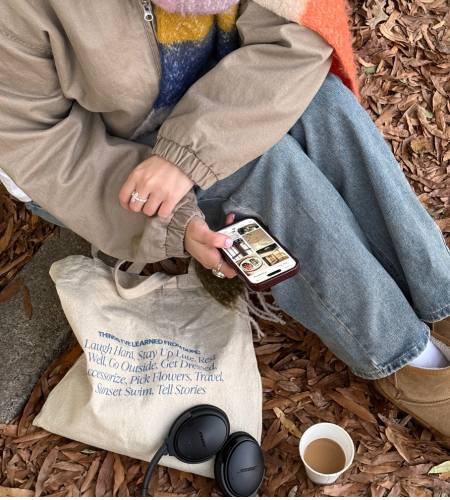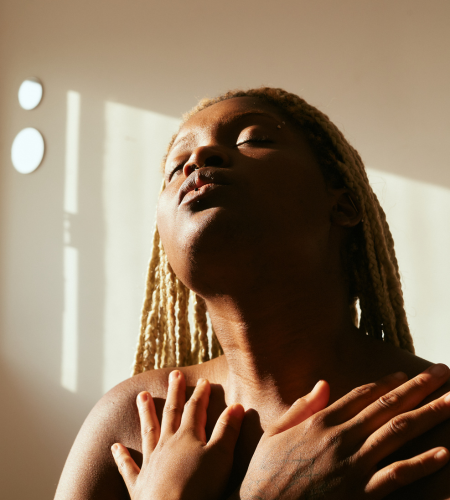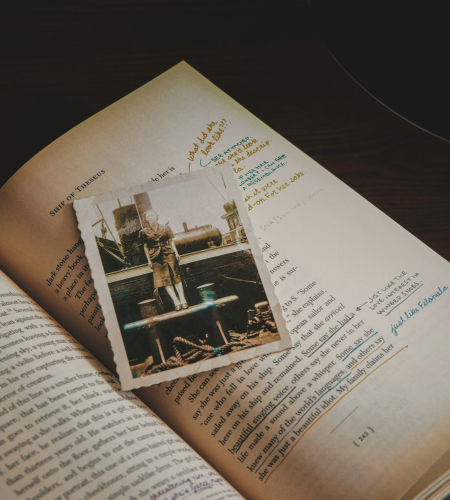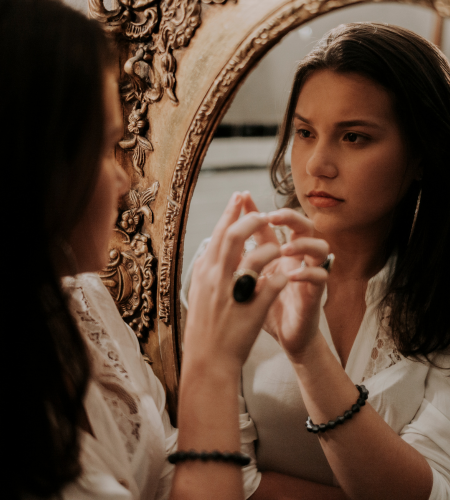
Have you ever felt like you had to be someone else just to fit in? Maybe you hold back your opinions, laugh at jokes you don’t find funny, or act differently in social situations depending on who you're around. It might feel like the safest thing to do—like the only way to be accepted, liked, or even just avoid awkwardness.
I get it. We all want to belong. And sometimes, it feels easier to play a role than to risk being judged. But here’s the thing: constantly hiding your true self isn’t harmless. It’s exhausting. It drains your energy, messes with your confidence, and can even leave you feeling lost—like you don’t really know who you are anymore.
The truth is, pretending to be someone you’re not comes at a cost. And while it might feel like the best option in the moment, it’s actually doing more harm than good. But don’t worry—there’s a better way.
In this post, we’re going to talk about the hidden toll of hiding your true self, the signs that you might be doing it (without even realizing), and what you can do to start feeling more you again. If any of this sounds familiar, keep reading—because you’re not alone, and you don’t have to stay stuck here.

Signs You’re Hiding Your True Self
So, how do you know if you’re not fully being yourself? Sometimes, it’s obvious. Other times, it sneaks up on you—you don’t even realize you’re doing it because it’s been your “normal” for so long.
If any of these sound familiar, you might be hiding your true self without even realizing it:
1. You change your personality depending on who you’re around.
At work, you’re super professional. With one friend group, you’re the chill, go-with-the-flow type. With another, you try to be the funny one, even if it doesn’t feel natural. It’s like you have a different version of yourself for every situation. Sure, we all adjust a little depending on where we are, but if you feel like a totally different person around different people, it might be because you’re afraid to let the real you show.
2. You agree with others just to avoid conflict.
Someone shares an opinion you don’t agree with, but instead of speaking up, you just nod and smile. Or maybe you laugh along at a joke that actually bothers you. You tell yourself it’s not a big deal—you just don’t want to make things awkward. But over time, always agreeing (even when you don’t) makes you feel invisible, like your voice doesn’t matter.
3. You feel exhausted after social interactions.
Spending time with people should feel good, right? But if you’re constantly pretending, filtering, or watching your every move, it’s no wonder you’re wiped out afterward. It’s like holding your breath for hours at a time. No wonder you're tired!
4. You second-guess yourself before speaking or acting.
Before you say something, you replay it in your head over and over, making sure it sounds “right.” You worry about whether people will like it. You hesitate to share your ideas or opinions because what if they think you're weird? What if you say the wrong thing? The pressure to be “perfect” keeps you stuck in your own head, making it hard to just be.
5. You suppress your emotions to avoid being "too much."
You feel sad, but you smile. You’re frustrated, but you shrug it off. You’re excited, but you tone it down. Somewhere along the way, you learned that showing emotions makes you “too sensitive,” “too dramatic,” or “too much.” So, you hide your true feelings and keep it all inside, but the truth is, it doesn’t go away—it just builds up until you feel disconnected from yourself.
6. You avoid situations where you might be truly seen.
Ever turned down an opportunity because it felt too personal? Maybe you avoid deep conversations, shy away from new friendships, or stay quiet in meetings. The idea of being truly seen—with all your thoughts, feelings, and quirks—feels uncomfortable, so you stay in the background where it’s safe.
7. You struggle to make decisions because you don’t trust your instincts.
Should you take the job? Say yes to the date? Try the new hobby? When you’ve spent so much time shaping yourself to fit what other people expect, it can be hard to know what you actually want. So, you overthink everything, waiting for someone else to tell you what to do.
8. You feel disconnected from yourself but don’t know why.
You’re doing all the “right” things—being likable, fitting in, keeping the peace—but something still feels off. You can’t quite put your finger on it, but deep down, there’s this nagging feeling that something’s missing. And that “something” might just be you.
Does Any of This Sound Like You?
If you’re nodding along, first of all—you’re not alone. So many of us learn to hide parts of ourselves to fit in, to avoid judgment, or just to make life feel easier. But here’s the thing: it’s not easier in the long run. Hiding who you are is exhausting, and it comes with a cost.
The good news? You don’t have to stay stuck in this cycle. There’s a way to feel lighter, freer, and more yourself again. And it starts with awareness. Now that you see the signs, you can start to shift things. And I promise—it’s worth it.
Next, let’s talk about what hiding your true self is actually costing you (and why breaking free is so important).

The Hidden Costs of Hiding Your True Self
You know that feeling when something just isn’t right, but you can’t quite put your finger on why? Maybe you’re exhausted all the time, stuck in relationships that don’t feel fulfilling, or just feeling off—like you’re going through the motions instead of really living.
If that sounds familiar, here’s something to consider: hiding your true self might be the reason behind those struggles.
Most people don’t connect the dots between pretending to be someone they’re not and the pain they feel in their daily lives. But the truth is, constantly filtering yourself, shrinking yourself, or playing a role takes a serious toll—mentally, emotionally, and even physically. Let’s break it down.
1. Emotional Drain: The Weight of Pretending
Think about how much energy it takes to put on a mask every day. To carefully choose your words so you don’t upset anyone. To hold back parts of yourself out of fear.
That’s exhausting.
And over time, it wears you down. You might feel anxious, frustrated, or even numb—like you’re disconnected from your own emotions. You might not even realize why you feel this way, but deep down, it’s because you’re carrying the weight of not being yourself.
2. Physical Exhaustion: Stress That Shows Up in Your Body
Ever felt drained after spending time with people—even if they didn’t do anything wrong? That’s because constantly monitoring yourself is like running an emotional marathon.
And stress doesn’t just stay in your head—it shows up in your body, too. You might notice:
✔️ Fatigue, even after a full night’s sleep
✔️ Headaches or tension in your neck and shoulders
✔️ A tight feeling in your chest or stomach
✔️ Random aches and pains with no clear cause
Your body is always listening. When you’re carrying stress from pretending, it’s only a matter of time before it starts to show up physically.
3. Strained Relationships: Feeling Alone, Even in a Crowd
Hiding parts of yourself can make it hard to truly connect with people. Sure, you might have friends, coworkers, or even a partner—but if they don’t know the real you, it can feel lonely, even when you're surrounded by people.
Deep down, you might wonder:
💭 Would they still like me if they knew the real me?
💭 Why do I feel so disconnected, even in my relationships?
💭 Why does no one understand me?
That feeling of emptiness? It’s not that people don’t care—it’s that they haven’t had the chance to know you. And that’s not your fault. But it does mean that letting yourself be seen is the key to feeling truly connected.
4. Lost Opportunities: Playing Small Instead of Going After What You Want
When you’re used to hiding, you start playing small without even realizing it. Maybe you don’t go for that dream job because you think you’re not good enough. Maybe you stay quiet in meetings, even when you have great ideas. Maybe you hold yourself back from opportunities that excite you because you’re afraid of standing out.
The problem? You are good enough. You do have great ideas. And you do deserve those opportunities. But if you don’t believe it, you’ll keep sitting on the sidelines, watching other people go after the things that you want.
So, What Now? (Hint: There’s a Way Out of This Cycle)
If any of this is hitting home, take a deep breath. This isn’t about blaming yourself—it’s about finally seeing the pattern that’s been running your life so you can change it.
Because here’s the good news: you don’t have to keep living this way. There’s another way—a way to feel lighter, freer, and actually happy being who you are.
And I want to help you get there.
In the next section, we’ll talk about why we start hiding in the first place (it’s not your fault, by the way) and how you can start breaking free from this cycle. Because you deserve more than a life that just looks good on the outside—you deserve a life that feels good, too. ❤️

Why We Do It (And Why It Feels Like the Right Choice at First)
By now, you might be thinking, Okay, I see how hiding my true self is affecting me… but why do I do it in the first place?
Great question.
The truth is, no one wakes up one day and decides to hide who they are. It happens slowly, little by little, often without us even realizing it. And at first, it actually seems like the smart thing to do.
Let’s talk about why, including a few common fears are cause people to hide their true, authentic self.
1. Fear of Rejection or Judgment
Raise your hand if you’ve ever been afraid of what people will think of you. 🙋
Yup, me too.
Nobody wants to feel judged, laughed at, or rejected. And at some point, we all get a message—whether from society, our peers, or even our families—that certain parts of us are too much, not enough, or just not acceptable.
So, we start tucking those parts away. We tone down our opinions. We hold back our quirks. We try to blend in instead of stand out.
It feels safer. But in reality? It just leaves us feeling unseen.
2. Society’s Pressure to “Fit In”
From a young age, we’re taught the importance of fitting in. In school, it’s all about not being “too different.” At work, it’s about being “professional” (which sometimes feels like code for “be less you”). Even on social media, there’s pressure to present a certain version of ourselves—the one that’s likable, polished, and “acceptable.”
So we adapt. We learn the rules. We mold ourselves to fit what’s expected. And for a while, it seems to work.
But here’s the problem: when you spend so much time trying to be what others want, you lose touch with what you want. And that’s a heavy price to pay.
3. Past Experiences That Taught Us It’s Safer to Hide
Maybe as a kid, you spoke up about something important and got shut down. Maybe you had people pleaser parents, and you learned to put everyone else first. Maybe you were made fun of for being “too loud,” “too sensitive,” or “too different.” Maybe someone made you feel like being yourself wasn’t good enough.
Those moments stick with us. And without even realizing it, we start protecting ourselves by playing small.
It makes sense, right? If being real got us hurt before, why risk it again?
But here’s the thing: hiding may have protected you in the past, but now? It’s just keeping you stuck.
4. The Temporary Relief of Fitting In
Let’s be real—hiding can feel good in the moment. It avoids awkwardness. It keeps things smooth. It spares us from our fear of rejection (or at least, that’s what we think).
It’s like putting a band-aid on a deep cut. It covers up our deep-rooted fears for now, but it doesn’t actually heal anything. And over time, the pain underneath starts bubbling up in other ways—anxiety, exhaustion, feeling lost, feeling like something’s missing.
That’s because something is missing: you.
The Good News? You Can Change This.
If you’ve spent years hiding, it’s easy to believe that this is just “who you are.” But it’s not who you are—it’s just a pattern. And patterns can be changed.
You don’t have to keep shrinking yourself. You don’t have to live your life based on what others expect.
There’s a way out of this cycle—a way to step into who you truly are without fear, guilt, or exhaustion. And that’s exactly what we’re going to talk about next.

The Light at the End of the Tunnel—There’s a Better Way
By now, you might be wondering, If hiding my true self is causing so much pain, then what’s the alternative?
The answer? Authenticity.
But let’s be real—"being authentic" sounds like one of those buzzwords people throw around without really explaining what it means. So, let’s break it down in a way that actually makes sense.
What Does It Mean to Be Authentic?
Being authentic simply means being the real you—without filtering, shrinking, or pretending to be someone you’re not. It’s about showing up as yourself, not just when it feels easy, but even when it feels a little scary.
It doesn’t mean you have to spill your deepest secrets to everyone you meet. And it definitely doesn’t mean you have to be the same person in every situation (we all have different sides to us).
It just means:
✔️ Saying what you actually think instead of what you think people want to hear.
✔️ Expressing your emotions instead of stuffing them down.
✔️ Making choices based on what you want—not just what others expect.
✔️ Letting yourself be seen, even when it feels vulnerable.
In short? Authenticity is living in a way that feels honest, free, and real.
Why Is This the Better Way?
In a recent survey, 92% of Gen Z respondents reported that being authentic and true to oneself is extremely or very important.
This isn’t merely a trend or a passing phase; it signals a deeper cultural shift toward valuing individuality and emotional honesty.
If you’ve spent years hiding, the idea of being fully yourself might sound risky. Maybe even impossible. But here’s why it’s worth it:
1. You’ll Feel Lighter and Free
When you stop pretending, you stop carrying the weight of trying to be someone you’re not. No more overthinking every little thing. No more exhausting social interactions. Just you, as you are.
And let me tell you—it feels so much better.
2. You’ll Build Real, Meaningful Connections
It's very difficult to have healthy relationships when you're disconnected from yourself.
Hiding your true self keeps people at a distance. You might have friendships, relationships, and connections, but if they’re built on a version of you that isn’t real, they’ll always feel a little… off.
Authenticity allows people to love you for who you really are. It allows intimate relationships to flourish. And those kinds of connections? They’re the ones that actually last.
3. You’ll Have More Confidence in Yourself
Think about it: if you spend all your time molding yourself to fit what others expect, how will you ever trust your own judgment?
When you start living authentically, you’ll make decisions for you—not based on what will make others happy. And the more you do that, the more confident you become in who you are.
4. You’ll Stop Feeling Stuck
So many people feel stuck in life without knowing why. They have this nagging feeling like something’s missing, but they can’t figure out what.
Here’s a secret: it’s usually because they’re not being true to themselves.
When you start living authentically, life opens up. You stop settling for things that don’t feel right. You start pursuing things that do. And suddenly, that stuck feeling? It starts to fade.

But What If It’s Hard?
Look, I’m not going to pretend that stepping into your true self is always easy. It can be scary. It can feel uncomfortable.
But here’s the thing: so is hiding. It’s just a different kind of hard.
One kind of hard keeps you trapped, exhausted, and disconnected. The other kind of hard leads to freedom, confidence, and real joy.
And between those two? I know which one I’d choose.
You Don’t Have to Do This Alone
If this is starting to resonate with you, but you’re wondering how to start living more authentically, don’t worry—you don’t have to figure it all out by yourself.
That’s exactly why I created The Authentic You Free Email Course—to help you take those first steps back to yourself in a way that feels safe, supported, and doable.
In the next section, I’ll tell you all about it. But for now, just know this: you are so much more than the version of yourself you’ve been told to be. And you deserve to live as the real you.
So take a deep breath, because change is coming. And it’s going to be good. ❤️
Final Thoughts
If this post resonated with you, take a moment to sit with it. Awareness is the first step to change, and just realizing that you’ve been hiding is a big deal. So be kind to yourself.
The good news? You don’t have to stay stuck.
Stepping into your true self is a journey, and it doesn’t have to happen all at once. You can start small—by noticing when you’re filtering yourself, by speaking up just a little more, by allowing yourself to be seen in safe spaces. Every little step you take toward authenticity counts.
And if you’re ready to go deeper, stay tuned—I’m working on something special to help guide you through this process. Soon, I’ll be launching a free email course designed to help you step into your most authentic self with confidence.
I can’t wait to share it with you. But in the meantime, I’d love to hear from you—have you ever felt like you’ve been hiding your true self? What’s one small step you can take toward authenticity today? Drop a comment below and let’s start this conversation. ❤️


You might be interested in
- How to Transform Your Life with Subconscious Reprogramming
- Why Having High Self Worth Can Change Your Life
- 9 Ways Fear of Judgement is Showing Up in Your Relationships







+ view comments . . .
+
view comments . . .
-